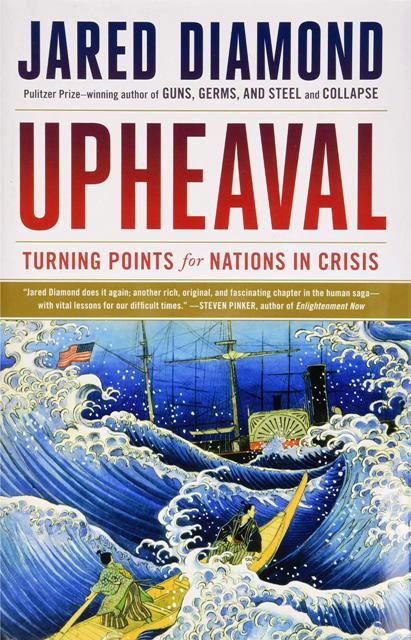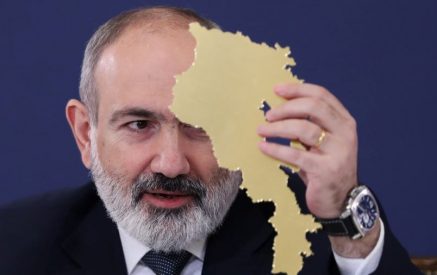Jared Diamond’s “prescriptions” and the Armenian reality
American biographer and philosopher Jared Diamond’s latest book was titled, “Upheaval: Turning Points for Nations in Crisis.” It was translated into Russian last year. The author looks at the serious national crises in six countries: Finland, Germany, Chile, Japan, Indonesia, and Australia, and how those nations overcame the crisis.
The crisis in the first two countries was linked to World War II, the military coup by Pinochet in 1973 in Chile, unprecedented American pressure in Japan in the mid-19th century, and post-war developments in Australia and Indonesia. The last three crises are not very familiar to us, the former Soviet people, and in this case it is interesting to get acquainted with the factual material as well.
And it is clear why the book can be interesting for the Armenian reader in general. Armenia, in my opinion, is in a deep crisis, and despite all the huge differences that make any country in the world unique, there are factors that all or some of them contribute to overcoming those crises.
Read also
But first you have to admit that you are in crisis. In Armenia, at least, it is not accepted by the authorities, and it was officially announced that the crisis was overcome with the June 2021 elections. That would be the case if we had a crisis of formal legitimacy, but I believe the crisis is in the political, state, military, educational, and spiritual spheres. In this respect, Diamond’s parallel between personal and national crises is interesting. They can ignite unexpectedly, like a fire, due to some strong external shock, and can develop over years, decades. For example, when a couple divorces, it may not be the result of one day or one week. In the same way, for example, the German crisis was the result of huge problems and catastrophic mistakes in that country, and not only ones that began in 1933.
If we find parallels with Armenia, then the military defeat, as much as it is a result of the current authorities’ incompetence, was “prepared” over a long period of time; I believe since 1994. No authorities were able to maintain military victories with stable and internationally-recognized peace. Therefore, in particular, it seems to me that the last three Armenian authorities could not pull the country out of the crisis, two of which matured the crisis, and the last one led the country to collapse. It is probably not worth noting that German rule changed after the 1945 capitulation. But this does not mean that the country should start from scratch; what is not subject to change, what was healthy even in times of crisis, must remain and develop. The way out of the crisis, according to Diamond, is partial change.
And so, the first step, according to the American researcher, is the general national consensus that the country is in crisis. I will list some of the factors mentioned by Diamond, which can contribute to overcoming the national crisis and which are still missing in Armenia. One of them is the understanding of having a common responsibility for actions.
Our government and the opposition, and most of the public elite in general, do not feel such responsibility, and different groups are busy blaming each other. The same can be said about the lack of honest self-esteem. It did not exist in the previous decades. Let’s remember the ruling party’s “most powerful army in the region,” “drinking tea in Baku,” and, finally, “new war, new territories.” There is no honest self-assessment even now. People on the street talk about “taking Nakhichevan” without seeing that we can not take even Lake Sev, which belongs to us by all laws. Another factor cited by the American researcher is honesty – the realization of one’s own failures. There are grounds to claim that we did not draw the right conclusions from our previous mistakes: the national liberation struggle of the 18-19th centuries, the experience of the First Republic, or the events of the last 30 years.
One of Diamond’s points of principle is national identity, which includes language, education, culture, history, as well as people and events about which there is a national consensus that they are a matter of national pride. In the previous analysis, I mentioned that all the authorities of the Third Republic approached this issue with surprising indifference, and I would even say with contempt. By the way, unlike the authorities of Soviet Armenia in the 60s and 70s, which (within the limits of Moscow, of course) took certain steps in that direction. Compare: at the initiative of the communist leadership, the “Erebuni-Yerevan” holiday is celebrated in all its semantic depth, the “flight of thought” of the current government is limited to the “performance” of washing carpets. Finland itself, which for decades had to comply with the demands of its powerful neighbor, the Soviet Union, invested heavily in education in the post-war period. Today, this small country has created the most advanced and developed education system in the world, and many of the school teachers have academic degrees. Are there people who doubt that such a focus on education is one of the main drivers of overcoming the crisis?
And, finally, Diamond spoke about “freedom from global political limitations.” That, of course, is a dream for Armenia and any other small country that probably will be impossible to implement. But as an element of state thinking, as a concept of principles, I think it is a helpful idea. That, by the way, is the principle of “excluding third parties.”
Aram Abrahamyan























































